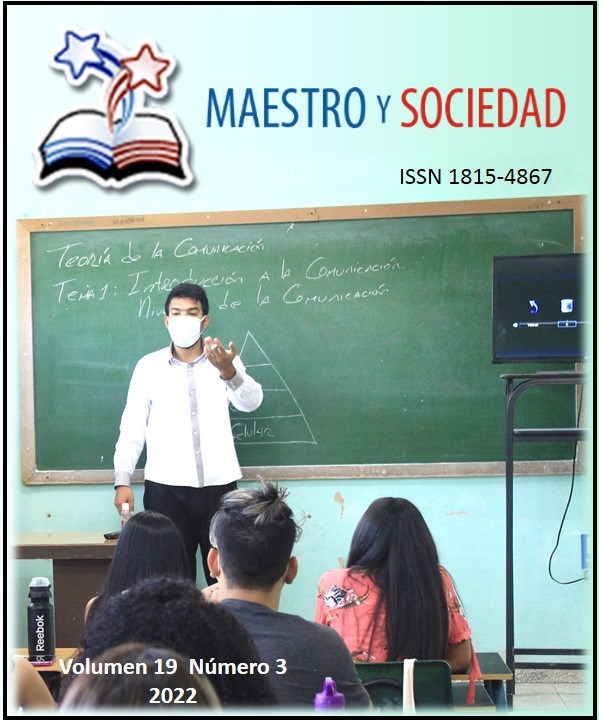Ethical-professional training as an integral component of the training process of medical students
Ethical-professional training as an integral component of the training process of medical students
Keywords:
historical background; ethical-professional training; Medicine studentsAbstract
The article aims to carry out a historical study about the premises, background and historical evolution of the ethical-professional training of the medical student in Cuba. From an analytical perspective, it contributes to the improvement of the ethical-professional process that favors current demands from an integral process. Therefore, a coherent and harmonious instrumentation is required, which focuses attention not only on understanding the ethical-professional training from the epistemological point of view, but also the behavior and attitudes to meet the challenge of reaching a high level in the most important aspects of the what to do and know how to be of the student, from an inclusive training, which is consistent with their social mandate.
References
Columbié Reyes, J., Columbié Ortiz, F., & Broock Romero, Y. (2016). El valor responsabilidad como unidad de análisis del proceso formativo integral en estudiantes de ciencias médicas. MEDISAN, 20(2). http://www.medisan.sld.cu/index.php/san/article/view/688
García Raga, M., Corrales Reyes, I. E., Reyes Pérez, J. J. (2015). La formación axiológica en los profesionales cubanos de la salud: una mirada hacia la universidad. Rev haban cienc méd, 14(1), 79-88. http://scielo.sld.cu/scielo.php?script=sci_arttext&pid=S1729-519X2015000100012&lng=es
Gutiérrez, R., Díaz, K. y Román, R. (2016). El concepto de familia en México: una revisión desde la mirada antropológica y demográfica. Ciencia Ergo Sum, 23(3). http://www.redalyc.org/articulo.oa?id=10448076002
Hodelín Tablada, R., & Fuentes Pelier, D. (2014). El profesor universitario en la formación de valores éticos. Educación Médica Superior, 28(1). http://www.ems.sld.cu/index.php/ems/article/view/100/148.
Horruitinier, P. (2006). La Universidad cubana: el modelo de formación. Editorial Félix Varela.
Izaguirre, M. (2019). Importancia de la formación ética de los estudiantes de medicina. An. Fac. med., 80(4), 507-510. http://www.scielo.org.pe/scielo.php?script=sci_arttext&pid=S1025-55832019000400017&lng=es. http://dx.doi.org/10.15381/anales.v80i4.16974
Paz Quezada, L. (2017). La sociedad y sus elementos una aproximación al pensamiento de Rafael Alvira sobre los elementos que configuran una sociedad. Auctoritas Prudentium, IX (17).
Pérez Tristá, B. (2019). La orientación del comportamiento humano en las instituciones de educación superior. Universidad de La Habana, Cuba. Rev retos, 13(2).
Reinoso Ortega, S., Columbié Reyes, J. L., Columbié Ortiz, F. J. (2014). Proyección axiológica de la Universidad Médica de Santiago de Cuba en su medio siglo de fundada. MEDISAN, 18(11), 1626-1632. http://scielo.sld.cu/scielo.php?script=sci_arttext&pid=S1029-30192014001100020&lng=es
Vázquez Garay, F., & Domeq Gómez, Y. (2019). Ética y virtud en la formación de profesionales de las ciencias médicas en Santiago de Cuba. MEDISAN, 23(6), 994-996. http://medisan.sld.cu/index.php/san/article/view/2829.
Velasteguí Córdova, M. E., Cruz Rodríguez, D. & Mena Peralta, M. R. (2021). El fortalecimiento de valores en los estudiantes de la Universidad Uniandes Puyo. Conrado, 17(79), 126-132. http://scielo.sld.cu/scielo.php?script=sci_arttext&pid=S1990-86442021000200126&lng=es&tlng=es
Zaldívar Rosales, Y., Fuentes González, H., & García Céspedes, M. (2021). Contradicciones sociales en la formación de valores desde la relación médico-paciente-familia en profesionales de las ciencias médicas. MEDISAN, 25(1), 238-250. http://medisan.sld.cu/index.php/san/article/view/3553
Published
How to Cite
Issue
Section
License
Copyright (c) 2022 Yaité Zaldívar-Rosales , Zoila Luisa Cedeño-Diaz , Tatiana Marañón-Cardonne, Martha Beatriz Vinent-Mendi

This work is licensed under a Creative Commons Attribution-NonCommercial-NoDerivatives 4.0 International License.
This journal provides immediate open access to its content, based on the principle that offering the public free access to research helps a greater global exchange of knowledge. Each author is responsible for the content of each of their articles.



























 Universidad de Oriente
Universidad de Oriente 